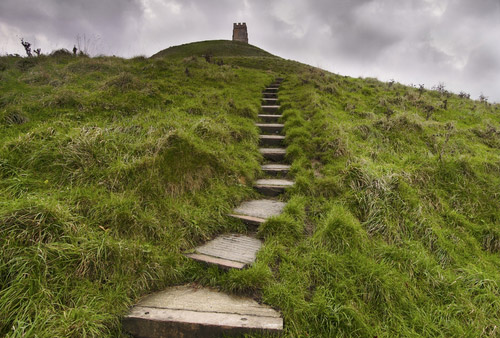Think about that...then repeat--
a psalm is word and rhythm and praise.
Can you hear it? The rhythm rumbles the bones. It resonates.
a psalm is word and rhythm and praise--
Do you see the way the rhythm of that line makes "word" and "praise" ride the crests of the waves. The words just jump out and declare "I'm here"? When the rhythm is right, you can even feel it.
A psalm is word and rhythm and praise, and understanding that rhythm not only helps to mine the meaning of the psalms, it also helps to imagine how they were sung during temple worship, the ceremonies celebrated in Judea during the 377-year reign of the House of David.
In previous posts, I have tried to imagine the public spectacle of the psalms: their music, the way they sounded in the temple courts, the parts played by the choir, the musicians, the speakers and--most of all--the people.

In the fifteen "songs of ascents" (Psalms 120-134), a different kind of performance emerges, one that could be repeated--and danced--in the temple courts, most certainly, but also one that could be shared between two believers or at a small festival gathering.
One story goes that the "songs of ascents" were sung at the steps leading to the temple gates--others have them sung at the steps into the Holy Place. I like this scenario because it compliments the idea that these psalms were chanted and repeated, chanted and repeated. The leader climbed a step and chanted a line; then the assembly joined him on the step and repeated the line. Step by step, worshipers chanted the song until they had entered the temple.
As I listened to this psalm in my Bible study, I realized that I couldn't hear parts anymore--I heard rhythm, and I also heard repetition. I felt grateful for the NIV translators whose hard work preserved so much of the rhythm of the words--and I also felt empowered to tweak the rhythm once I had the gist.
I want to present the Psalm below, then, as a chant, not as straight text. I hear each line presented by a leader and repeated by an assembly. As the psalm develops, so does a natural rhythm. For me, it develops in 4/4 time, and that's the way I will present the psalm below.
Grab a tambourine or a cymbal, then!
OUT of the DEPTHS i CRY to you, LORD--Out of the depths I cry to you, LordO LORD [beat] HEAR myVOICE [three beats]O Lord hear myVoiceCan you feel the rhythm of the lines?
Moreover, I love the way the psalm begins. A song of ascents that begins in the "depths"? Of course it does! Where else could such a psalm start? My imagination races to think of ascents in the Holy Land: the incline leading from Jericho & the Dead Sea to the hills of Jerusalem; the walk upwards through the city to the Temple Mount; the climb up the steps of Solomon's Porch to the temple gates, or the steps that led from the courtyard to the temple entrance.
With each step I feel the beat--one, two, three four, "Out of the depths, I cry to you, Lord."
let your EARS be atTENtive to CRIES of MERcyLet your ears be attentive to cries of mercyif YOU, LORD, [beat] kept a REcord ofSINS [three beats]If you, Lord, kept a record ofSinsO.LORD [beat] WHO couldSTAND? [3 beats]O Lord who could stand?But with YOU there IS forGIVEnessBut with you there is forgivenessTHERE.FORE [beat] YOU areFEARED [three bearts]Therefore you are feared.
A plea for mercy emerges--"cries" is the third beat of the line--and the plea swells with the repetition. The rhythm slows down the words, and we spend a line (four beats) on the word, "sins." The speaker is humble, thoughtful, vulnerable. The words have slowed, but the beat will pick up in the 2nd half of the psalm
I WAIT for the LORD, my SOUL waits YETI wait for the Lord, my soul waits yetAnd in HIS.WORD i PUT my HOPEAnd in his word I put my hopeMy SOUL.WAITS for the LORD [beat]My soul waits for the LordMORE than WATCHmen WAIT for MORNingMore than watchmen wait for morningMORE than WATCHmen WAIT for MORNingMore than watchmen wait for morning
At this point, the key line of the psalm could be repeated forever, in my opinion. Waiting for the Lord is a theme of many psalms (40, 27, 89, 119, 62, to name a few). But the psalmist moves from "I wait for the Lord" to "my soul waits" so quickly that many readers may miss the transition.
I understand waiting, and I know darkness, yet I am so easily distracted. My soul understands waiting and darkness, and there is this idea that it doesn't give up, even if I do.
As an assembly we are almost to the top step, ready to enter the temple for worship. Dawn breaks, and the watchman lets out a shout. We can look back over the city, over the valley, toward the hills warming with glowing sunlight. The worship leader advances:
o ISraEL, place HOPE in the LORDO Israel, place hope in the Lordi SING the LORD'S unFAILing LOVEI sing the Lord's unfailing lovein HIM is FULL reDEMPtionin him is full redemptionthe LORD himSELF reDEEMS usthe Lord himself redeems usfrom ALL.OUR.SINSfrom all our sins
In this last stanza, I have made changes to the NIV translation, mainly to preserve the rhythm, which slows from four beats to three in the last three lines and ends with the stark words: all. our. sins. It's a strange mix of emotions that I feel when I close this song
The chant began in the depths and climbed to a place where watchmen see dawn, where sinners find forgiveness. It climbed through calls for mercy. It ended with redemption from all our sins.
And as the rhythm flowed...and the chants repeated...the songs ascended, and the worship raised higher, higher, heavenward.
